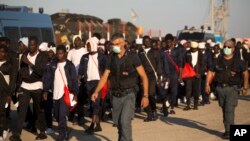European Union officials on Thursday reaffirmed the need to tackle Europe's migrant crisis in Libya and surrounding countries, amid continued resistance in Europe to welcome refugees.
Italy announced some 30 million euro (US$34 million) in new investments aimed at preventing migrants from ever reaching or leaving Libya's lawless shores where smugglers operate. And EU interior ministers warned they might sanction migrants' home countries with visa restrictions if they refuse to take their people back when their European asylum bids fail.
Europe's migration crisis was on the agenda at two meetings Thursday: an informal EU-wide interior ministers meeting in Tallinn, Estonia, and a meeting in Rome of foreign ministers from Libya, surrounding African countries and selected European partners.
Amid mounting anti-immigrant sentiment across Europe, Italy has increased its complaints that it can no longer shoulder the burden of the migrant crisis alone. Faced with national elections later this year or next, the Italian government has recently threatened to close its ports to non-Italian flagged rescue ships in hopes of forcing other European countries to take migrants in.
In Rome, Foreign Minister Angelino Alfano said Italy was pledging 10 million euros to help Libya's southern neighbors - Niger, Chad and Sudan - better control their borders so migrants can't reach Libya. Another 18 million euros is slated for the voluntary repatriations of migrants who reach Libya and decide not to continue their journeys north.
“In order to lower the numbers leaving Libya, we have to lower the numbers entering,” Alfano told a press conference.
In Tallinn, the interior ministers called for aid groups conducting rescue operations in the Mediterranean to follow a code of conduct, after prosecutors in Italy have accused some of complicity with Libyan-based smugglers.
The ministers also vowed to crack down on countries that refuse to take their nationals home when their asylum bids fail in Europe, including imposing limits to visa programs.
And they promised to “enhance the capacity of the Libyan coast guard,” to better patrol its coasts and turn back migrant boats, despite renewed criticism from Amnesty International that such a policy is “reckless” given Libya's lawlessness.
On the eve of the meeting, the human rights group said the turnback policy risked victimizing desperate migrants even more since they risk grave human rights abuses once returned to Libya and trapped there.
More than 2,000 migrants to Europe have died at sea so far this year while over 73,380 have reached Italy. By year's end, the number of arrivals is expected to match or exceed the 181,400 who made it in 2016, which was more than in the two previous years, the report said.
Amnesty said it was “deeply problematic” to unconditionally fund and train Libya, where human rights are lacking and the coast guard has been known for violence and even smuggling.
The group cited an August incident off Libya's coast in which attackers shot at a Doctors Without Borders rescue boat. A U.N panel of experts on Libya later confirmed that two officers from a coast guard faction were involved.
In May, the Libyan coast guard intervened in a search-and-rescue operation another non-governmental organization was performing. The coast guard officers threatened migrants with weapons, took command of their wooden boat and took it back to Libya, Amnesty reported.
Amnesty is not alone in its concern.
The search-and-rescue director for Save the Children, Rob MacGillivray, said in a statement that rescued migrants have recounted horrors from Libya, including claims of sexual assaults, sales to others for work and whippings and electrical shocks in detention centers.
“Simply pushing desperate people back to Libya, which many describe as hell, is not a solution,” MacGillivray said.
EU Migration Commissioner Dimitri Avramopoulos conceded at a recent news conference in Paris that the EU is drawing on a country in “very precarious conditions.”




